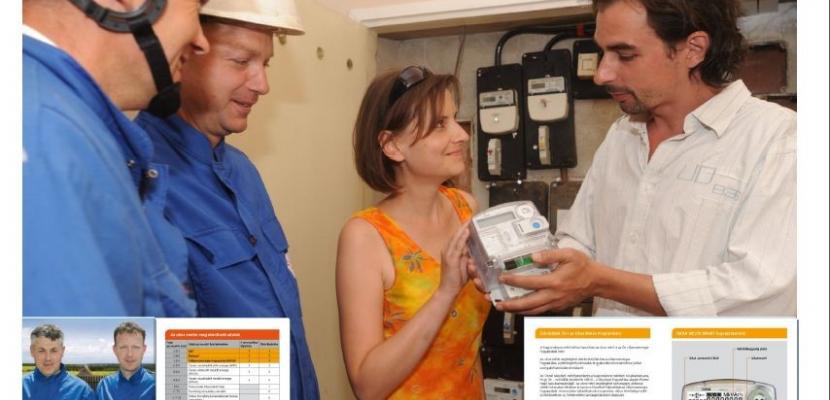Image

Smart Synergy Project
Published on 10 June 2018

Hungary
Dél-Alföld
This is the good practice's implementation level. It can be national, regional or local.
About this good practice
Smart Synergy Project was launched to examine the wholeness of smart metering roll-out, also to obtain practical experiences on rollng out and operating the grid.
Objectives respond to following challenges:
to examine willingness of consumers to benefit from smart metering and to modify their consumption behaviour,
to demonstrate technical and technological possibilities and conditions of establishing smart grids,
to test appropriateness of smart metering from aspect of delivery of expected services,
to contribute to the most appropriate business model taking into consideration actual way of operation of the market,
to introduce costs of establishment and operation of smart grids, to pilot compliance of smart grids with data protection and data security.
Activities (only the electricity relevant parts):
installing 3.000 electricity smart meters (500 of PLC and 2.500 of GPRS types) in service area of DÉMÁSZ, South Great Plain Region of Hungary,
delivering 12.000 test measurements on test consumer panel (1.727 consumers with 2.400 meters) equipped with electricity smart meters, also 6.000 control measurements (on 800 meters and 346 smart meters) with 15 minutes precision smart meters on control consumer panel,
operation of consumer webportal.
Main stakeholders involved:
Other hungarian DSOs who financed and implemented the project. Besides them Energy and Public Utility Regulatory Authority used the gained experiences in its regulatory work.
Objectives respond to following challenges:
to examine willingness of consumers to benefit from smart metering and to modify their consumption behaviour,
to demonstrate technical and technological possibilities and conditions of establishing smart grids,
to test appropriateness of smart metering from aspect of delivery of expected services,
to contribute to the most appropriate business model taking into consideration actual way of operation of the market,
to introduce costs of establishment and operation of smart grids, to pilot compliance of smart grids with data protection and data security.
Activities (only the electricity relevant parts):
installing 3.000 electricity smart meters (500 of PLC and 2.500 of GPRS types) in service area of DÉMÁSZ, South Great Plain Region of Hungary,
delivering 12.000 test measurements on test consumer panel (1.727 consumers with 2.400 meters) equipped with electricity smart meters, also 6.000 control measurements (on 800 meters and 346 smart meters) with 15 minutes precision smart meters on control consumer panel,
operation of consumer webportal.
Main stakeholders involved:
Other hungarian DSOs who financed and implemented the project. Besides them Energy and Public Utility Regulatory Authority used the gained experiences in its regulatory work.
Expert opinion
Smart metering can have a high impact on energy performance by enabling consumers to see their energy use, and make corrections accordingly. This pilot project examined the willingness of customers to use smart meters, and how they could contribute to the development of smart grids. Such pilot projects can be very useful for establishing blockages to roll-out of technology, and finding ways to overcome them. The results of this pilot should be examined by regions looking to roll-out similar schemes.
Works at
Interreg Europe Policy Learning Platform
Resources needed
There is no data available. Hungarian law on electric energy authorised universal and license providers to test at their own costs smart metering so as to outline long term costs and benefits. In case of DÉMÁSZ incurred costs in 2012-13 were 500, million HUF (cca. 1,6 million EUR, current prices).
Evidence of success
Beyond technical-technological findings of rolling out smart meters, results surveying of consumer behaviour:
56% of respondents (big consumers, countrymen, young, people with higher educational attainment) is willing to restructure their electricity consumption patterns provided that they realize 3-5 EUR/month saving.
42 % (the elderly, small consumers, people with lower educational attainment) remains aloof.
Reading data of meters still operates, obtained data is shared with customers.
56% of respondents (big consumers, countrymen, young, people with higher educational attainment) is willing to restructure their electricity consumption patterns provided that they realize 3-5 EUR/month saving.
42 % (the elderly, small consumers, people with lower educational attainment) remains aloof.
Reading data of meters still operates, obtained data is shared with customers.
Potential for learning or transfer
The Smart Synergy project is easily transferable to other SET-UP regions as it has a piloting profile of installing electricity smart meters and surveying consumer behaviour patterns related to that. The transfer of the project could give direct indication of electricity consumers on their willingness of use this advanced type metering. Analysis of the conclusions of this project should be considered when taking major investments decisions on smart grids.
In the Smart Synergy Project beyond the practical questions (installation, operation) the sensitiveness and the responses of the users were researched in connection with smart metering. The number of smart meters installed by DSOs was satisfactory to provide for a representative research result on national level. The lessons learnt are meaningful for not only DSOs, but for further actors intending to initate such project also.
In the Smart Synergy Project beyond the practical questions (installation, operation) the sensitiveness and the responses of the users were researched in connection with smart metering. The number of smart meters installed by DSOs was satisfactory to provide for a representative research result on national level. The lessons learnt are meaningful for not only DSOs, but for further actors intending to initate such project also.
Further information
Website
Good practice owner
You can contact the good practice owner below for more detailed information.
Organisation
NKM Áramhálózati Kft. 6724 Szeged, Kossuth L. sgt. 64-66. Contact person: Mr. István NAGY, e-mail: [email protected]

Hungary
Dél-Alföld
Contact
deputy managing director
